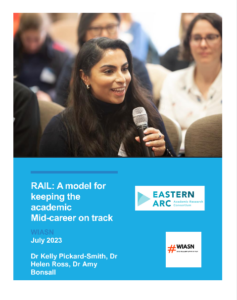The challenges for mid-career researchers: New EARC report published
31 August 2023
 Mid-career researchers (MCRs) face significant challenges in developing their careers, and these are increasing as the pressures and expectations within modern higher education have mounted.
Mid-career researchers (MCRs) face significant challenges in developing their careers, and these are increasing as the pressures and expectations within modern higher education have mounted.
A new report provides evidence of these challenges, and makes eight recommendations for addressing them. Commissioned by Eastern Arc and undertaken by Women in Academia Support Network (WIASN), the report makes clear that the barriers faced by MCR are ‘pervasive and entangled in their complexity’, and an academics mid-career is a ‘pinch point’ at which academics face a ‘competing number of additional roles, responsibilities and activities.’
The report’s authors, Dr Kelly Pickard-Smith, Dr Helen Ross, and Dr Amy Bonsall, analysed 254 responses to a survey open to academics at Eastern Arc universities and beyond. Narrative questions within the survey elicited a total of 2,147 written responses, and 13 in-depth qualitative interviews were conducted.
Findings
The results of the research are disturbing. Over 80% of respondents reported experiencing barriers to their mid-career progression, and more than half reported experiencing and/or witnessing structural issues or discrimination that have hampered their own or others’ success. Other findings included:
- 98.8% felt mid-career was not clearly defined by universities;
- 62.8% reported their university didn’t provide training specific to midcareer;
- 79.9% reported they felt universities do not provide a good level of career support at midcareer stage.
The challenges for MCR include:
- Unclear parameters at individual and institutional level about MCR duties and success criteria;
- Workload/time stress;
- Lack of training and mentoring;
- Limited funding/grant opportunities and reimbursement culture;
- Contract disparities arbitrarily applied where contract type/job role preclude staff from applying for career enabling opportunities;
- Structural barriers and discrimination affecting women returning from maternity leave, working class, disabled and migrant/international and racially marginalised academics. These groups experience greater rates of attrition, career stagnation and precarity.
Recommendations
The report makes eight recommendations, based around a ‘RAIL’ framework: Rethink; Attain; Include; Lived experience.
- RETHINK what midcareer means. Reframe it as a time of expansion and not reduction, with increased opportunities developed around a set of ‘personas’ that would allow for a more nuanced model.
- ATTAIN the necessary skills to develop through clearer training,including that for ‘procedural’ skills and knowledge, such as how to be a line-manager or head of department.
- INCLUDE MCRs more fully by removing contractual idiosyncrasies where rigid contracts become unnecessary ‘gatekeepers’/blockers to midcareer staff accessing or applying for career opportunities and promotions. There should also be MCR-specific opportunities to tackle attrition and career stagnation rates for staff who are under-represented and systematically marginalised.
- LIVED EXPERIENCE should be fully recognised and incoporated in HR systems, so that formal and informal mentorship/sponsorship programmes, networks and collaboratives to thrive. Alternative and meaninful definitions of success should be encouraged and embraced, including proper recognition and rewarding of ‘softer’ skills such as mentoring, coaching and sponsorship.
‘This is a hugely important report,’ said Phil Ward, Director of Eastern Arc. ‘We have known for some time that mid-career researchers are ‘the squeezed middle,’ facing the perfect storm of workplace demands, unrealistic expectations, and changes within their personal life such as parenting, care-giving and moving home. However, what we’ve known up until now has been anecdotal. This report provides clear evidence of the current situation and, more importantly, offers a blueprint for addressing it.’
‘We intend to bring together stakeholders from across the Consortium to start to implement these recommendations. I would like to thank the authors for this, and look forward to continuing to work with them to amplify the messages from the report nationally. The sector must learn from it and act on it.’
The full report is available here. Hard copies are available at the EARC and WIASN conferences, and upon request.
